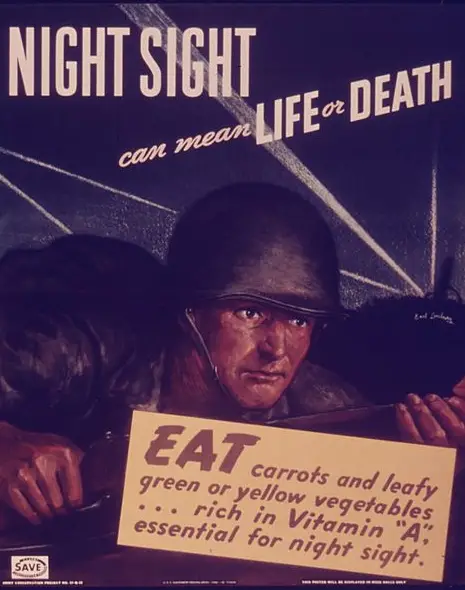Eating Carrots Improves Your Vision-Truth! & Fiction!
Summary of eRumor:
Some are questioning the old adage that eating carrots improves your vision.
The Truth:
Eating carrots can help improve vision in certain conditions, but the effect of carrots on eyesight has been exaggerated for decades.
The reason carrots have been given too much credit for improving vision is rooted in World War II.
Britain’s Royal Air Force (RAF) began using on-board Airborne Inception Radar (IA) to shoot down German planes over London during night in 1940. Because the radar technology was a secret, the Ministry told newspapers that RAF fighter pilots were so precise at night because they ate carrots, which supposedly improved their night vision, the Smithsonian magazine reports:
Whether or not the Germans bought it, the British public generally believed that eating carrots would help them see better during the citywide blackouts. Advertisements with the slogan “Carrots keep you healthy and help you see in the blackout” (like the one pictured below) appeared everywhere.
So, the RAF essentially fibbed that carrots were behind its pilot’s nighttime accuracy, and the public ate it up. At some point, it became generally accepted that carrots improve overall vision — not just night vision — and that’s been repeated at countless dinner tables around the world.
When it comes to night vision, Emily Chew, the deputy clinical director at the National Eye Institute, backs up the claim that carrots can help. Carrots are rich in beta-carotene, which the body uses to make vitamin A. Vitamin A helps the eye convert light into a signal that’s transmitted to the brain, which can help improve vision nighttime vision, Chew told Scientific American magazine:
But exactly how many carrots would be needed to optimize night vision remains less clear. Most studies have so far looked at the benefits of beta-carotene or vitamin A supplements, not carrots specifically. One randomized control study in 2005 examined how consumption of roughly 4.5 ounces of cooked carrots six days a week stacked up against other vitamin A–rich options such as fortified rice, amaranth leaf and goat liver for helping address night blindness in pregnant women. The result: all the foods performed roughly the same, although the vitamin A supplement did best of all. The study found that a regular diet of the cooked carrots for six weeks helped to bring women’s response to darkness to normal levels. (In Western nations about 30 percent of dietary vitamin A comes from beta-carotene but in some developing countries it is the sole source of vitamin A.)

When it comes to improving overall vision and eye health, however, the answer is a balanced diet of fruits and vegetables, not carrots alone, according to the National Eye Institute:
You’ve heard carrots are good for your eyes. But eating a diet rich in fruits and vegetables, particularly dark leafy greens such as spinach, kale, or collard greens is important for keeping your eyes healthy, too.i Research has also shown there are eye health benefits from eating fish high in omega-3 fatty acids, such as salmon, tuna, and halibut.
But, when it comes to using carrots or any other foods to improve your eyesight, don’t expect too much. Research has found that the body protects itself against excessive amounts of vitamin A because it can become toxic at high levels. So, if you eat nothing but carrots in hopes of gaining 20/20 vision, your body will be working against you the entire time.
In conclusion, carrots can improve vision in certain conditions (i.e. at night), and they’re good for overall eye health. Just don’t believe reports that eating carrots (or any other vitamin A rich food) will improve your overall vision.
